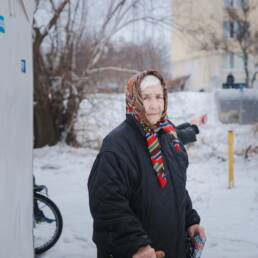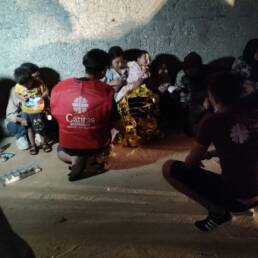In a context of crackdowns on irregular migration, we are witnessing a real European trend to stigmatise, pose obstacles to and criminalise humanitarian assistance provided by organisations and volunteers to migrants in distress.
Caritas Europa warns that this hostile environment creates a chilling effect on solidarity that further fuels toxic discourses on migration. In addition, criminalising solidarity is dangerous for democracy, as it erodes social cohesion and the fundamental rights of expression and association.
In this position paper, Caritas analyses this phenomenon and proposes recommendations to national and European policy makers, to ensure that solidarity is supported instead of being criminalised.
Support to migrants wrongly associated with facilitating irregular migration
This position paper provides a detailed overview of different cases in which organisations -including ours- and volunteers that help migrants, have been wrongfully accused of facilitating irregular migration and human smuggling. Examples include, to name a few, cases of police harassing volunteers providing food and offering shower facilities to destitute migrants in Calais, citizens put on trial for providing shelter to asylum seekers in Belgium, and the prosecution of NGO staff members for operating search and rescue (SAR) missions along the coast of Italy and Malta.
Humanitarian rescue is not criminal, but it also isn’t heroic, it’s necessary,” said Seán Binder, 25, a volunteer who spent 106 days in pre-trial detention in Greece. He is accused of smuggling and other charges for the humanitarian support he provided to migrants in Lesbos. He is currently awaiting his trial and could be faced with 25 years in prison if convicted.
European legislation against human smuggling not safeguarding humanitarian assistance
As several researchers highlighted, Caritas Europa concludes that the European legislation against human smuggling (called “facilitation package”) does not contain sufficient safeguards to ensure that humanitarian support is not wrongfully conflated with smuggling.
In line with what the European Parliament called for several times, we urge EU policy makers to clarify EU legislation against smuggling to ensure that it does not lead to the criminalisation of humanitarian support to migrants. In addition, an independent mechanism to monitor cases of criminalisation should be set up.
Protecting and promoting solidarity towards migrants
Caritas Europa also calls policy makers to create a positive and an enabling environment for civil society organisations to carry out activities that contribute to enhance solidarity and democracy. Several instruments such as the UN human rights defenders’ declaration and the Global compact on migration should be fully implemented. These would enhance the right to promote human rights and fundamental freedom and advance migrants’ rights, dignity and access to basic services. Finally, we call for an increased financial support to CSOs, and the recognition of the crucial role they play to save lives, restore peoples’ dignity and contribute to democracy altogether.
More information
Leïla Bodeux
Senior Policy and Advocacy Officer
Tel: +32 (0)2 235 26 55
Mob: +32 (0)478 585 409
lbodeux@caritas.eu




